Are you looking for the best AI conclusion generator to save time from having to manually create a TL;DR, an executive summary or a conclusion for your content?
I know that some of you will be looking for a more basic conclusion generator for a one-off task, while others will be looking for a more advanced and comprehensive one (e.g., handle client work).
In this article, I’ll go over the 10 best AI-powered conclusion generators on the market in 2025, going over both free-to-use and advanced generators for different use cases.
What are the factors to consider when evaluating AI conclusion generators?
Without spending too much time on this, here are the 3 key factors I’d consider in an AI conclusion generator:
#1: Quality of final output
The main reason why you’re looking for a conclusion generator is that you are looking to produce human writer-level quality in your conclusions.
That’s why the quality of the final output was the #1 thing I considered when building this list, including how the AI platform took your input into consideration.
➡️ When I was testing the different conclusion generators, I looked at how they used the information I provided them with to synthesize the core learnings.
#2: Being able to refine and update your output
Let’s face it – AI rarely gets your desired outcome the first time.
This is why it was important for me to see conclusion generators that allow you to refine and update your output.
#3: Cost of the generator
Although most of the conclusion generators are free, I also looked at a few more advanced paid conclusion generators that can help you generate conclusions for different clients, which are written as if you wrote them.
What are the 10 best AI-powered conclusion generators in 2025?
Here are the 10 best AI conclusion generators on the market out of the 30+ mini tools I reviewed:
#1: Team-GPT
Team-GPT offers the best place to generate conclusions on the market because you can customize an AI model to write conclusions like you would, collaborate with your team, and refine your best prompt with our AI prompt builder.
But if Team-GPT does not have a traditional conclusion generator, what makes it ideal for the job in that case?
➡️ Team-GPT offers 3 things that other conclusion generators do not:
- The ability to customize tools like ChatGPT and Claude to write conclusions like you.
- A prompt builder, which will help you refine your conclusion generation prompt to fit with your content.
- Being able to collaborate with your team on conclusion generation so you can learn from prompts from one another and save your best prompts.
💡 By having better prompts and collaborating with your team, you can write better conclusions for your clients or your brand in the long run.
Here’s how you can generate human-like conclusions with Team-GPT alongside your team:
Step #1: Build your best conclusion generation prompt with the Prompt Builder
The way our prompt builder works is that you have to begin by describing your task.
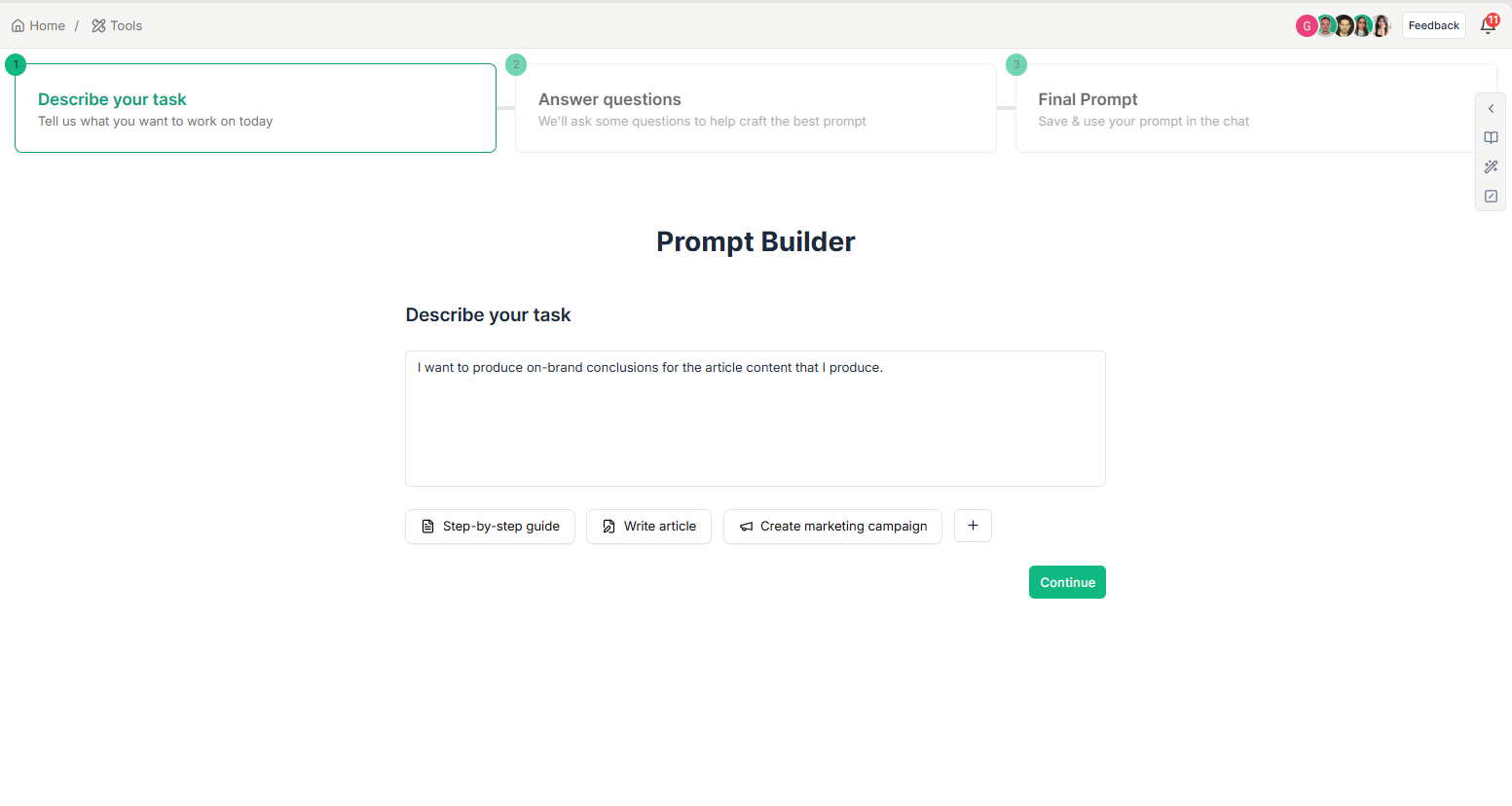
After that, our prompt builder will ask you to answer a few follow-up questions about the conclusion that you are looking to generate.
For me, these questions were:
- Could you describe your brand’s voice and style, or provide brand guidelines, so the conclusions align with your brand identity?
- What are the primary topics of the articles, and who is the target audience you’re writing for?
- What is the main action you want readers to take after reading the conclusion of the article?

As a final output, Team-GPT generated a prompt to use to generate my conclusion, which provides information about the persona, context, and task for the tool.
For optimal results, I included information about the specific article at hand, ‘’What is Wardrobing’’ as a topic to target e-commerce leaders looking to battle wardrobing.
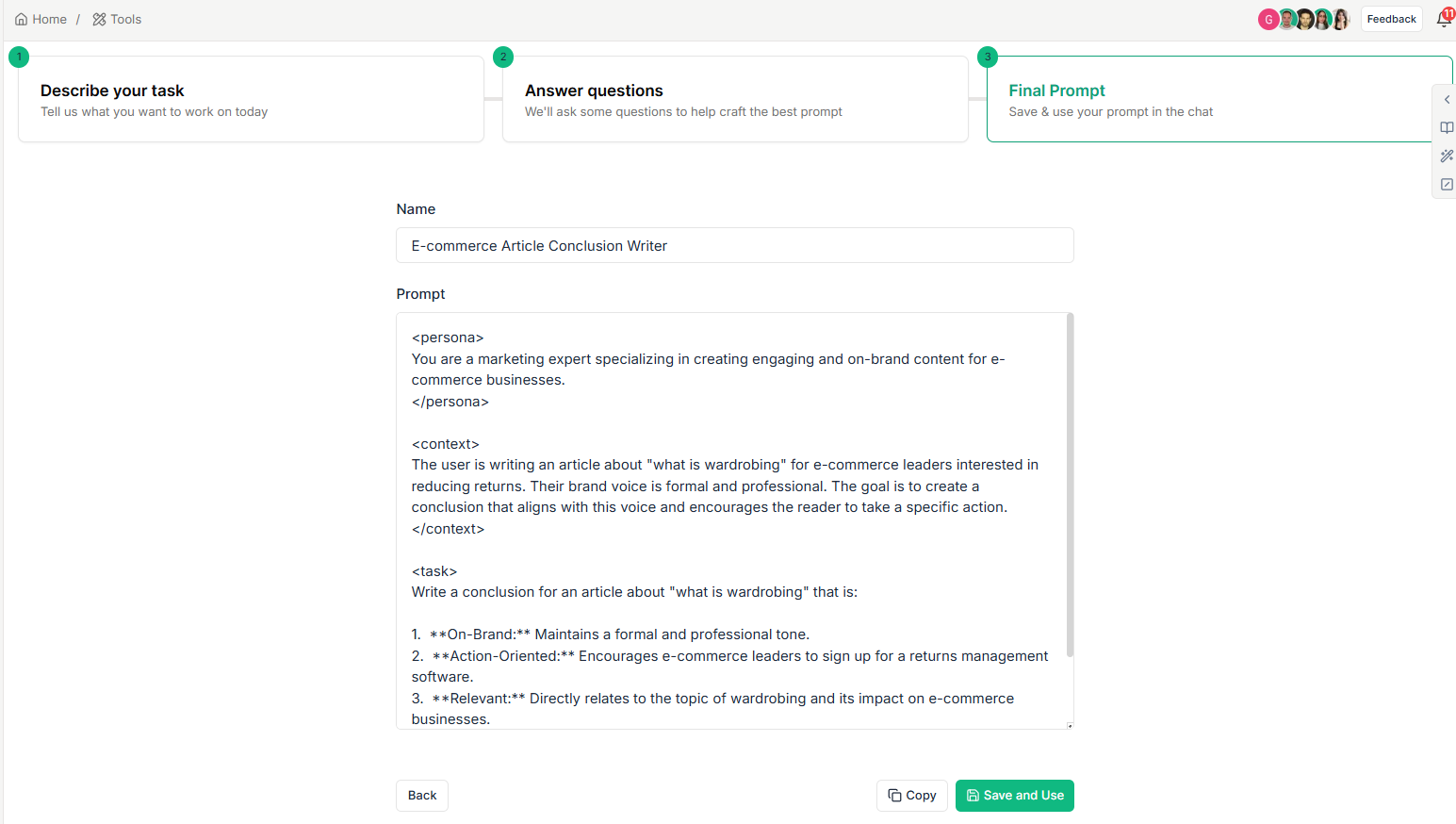
You can learn more about how you can use our prompt builder by watching this guide on it: How to use the Prompt builder | Team-GPT
Step #2: Click on ‘’Save & Use’’ and Apply the prompt
After you click on ‘’save and use’’, a new form pops up asking you to fill out your content, tone style, and target audience.
Our platform lets you choose the AI model that you want to use for the output, such as ChatGPT’s o3 model.
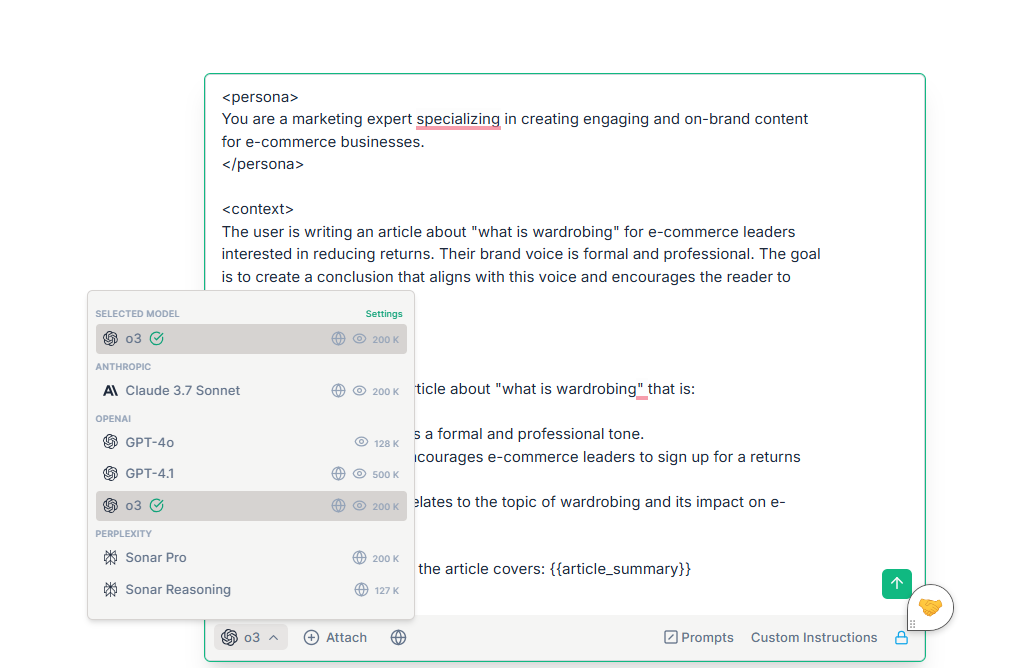
💡 Pro Tip: This does not have to be an effort from you alone. Team-GPT lets you collaborate with your teammates on prompts and save your best prompts.
Here’s the final output that I was provided by Team-GPT after I provided it with my article:

ChatGPT’s o3 provided me with a conclusion that:
- Clearly stated the key takeaways from the article.
- Pitched my solution in the end.
➡️ If you’re not satisfied with the level of output, you can send a follow-up prompt to refine the text further.
For example, I asked it to ‘’Re-do this page to be with ”Key Takeaways” with bullet points in the end’’ so the content can be more digestible for my readers.

Step #3: Turn into a page
Everything you generate inside of Team-GPT (be it an FAQ or a conclusion) can be turned into a page, similar to Google Docs, that you can use to further refine it.
You just have to click on ‘’Turn to Page’’ on the bottom right of the generated output.
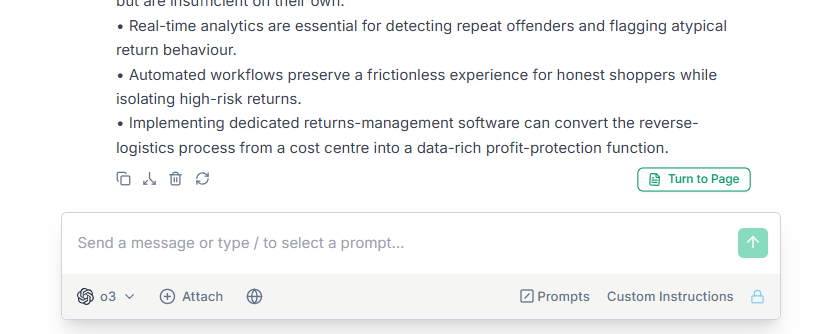
I use this tool to paraphrase or shorten paragraphs that I did not like that the AI tool had generated for me, which you can do by double-clicking on the text.
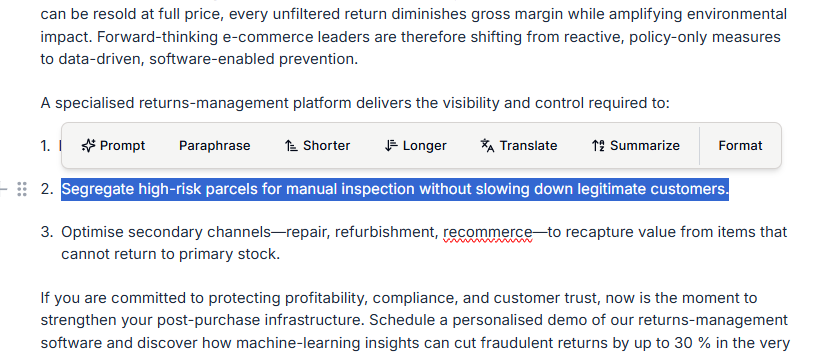
(Optional) Step #4: Add custom instructions to the AI model to write conclusions like you
If you’d like to step up your content quality further and produce on-brand conclusions, you can add custom instructions to ChatGPT or the AI model you prefer to use.
Start by clicking on ‘’Custom Instructions’’ on the bottom right of your screen.

From there on, you have to click on ‘’Create instruction.’’
You’ll also notice that you can store these instructions, as I have done for writing LinkedIn posts or writing SEO-optimized content.
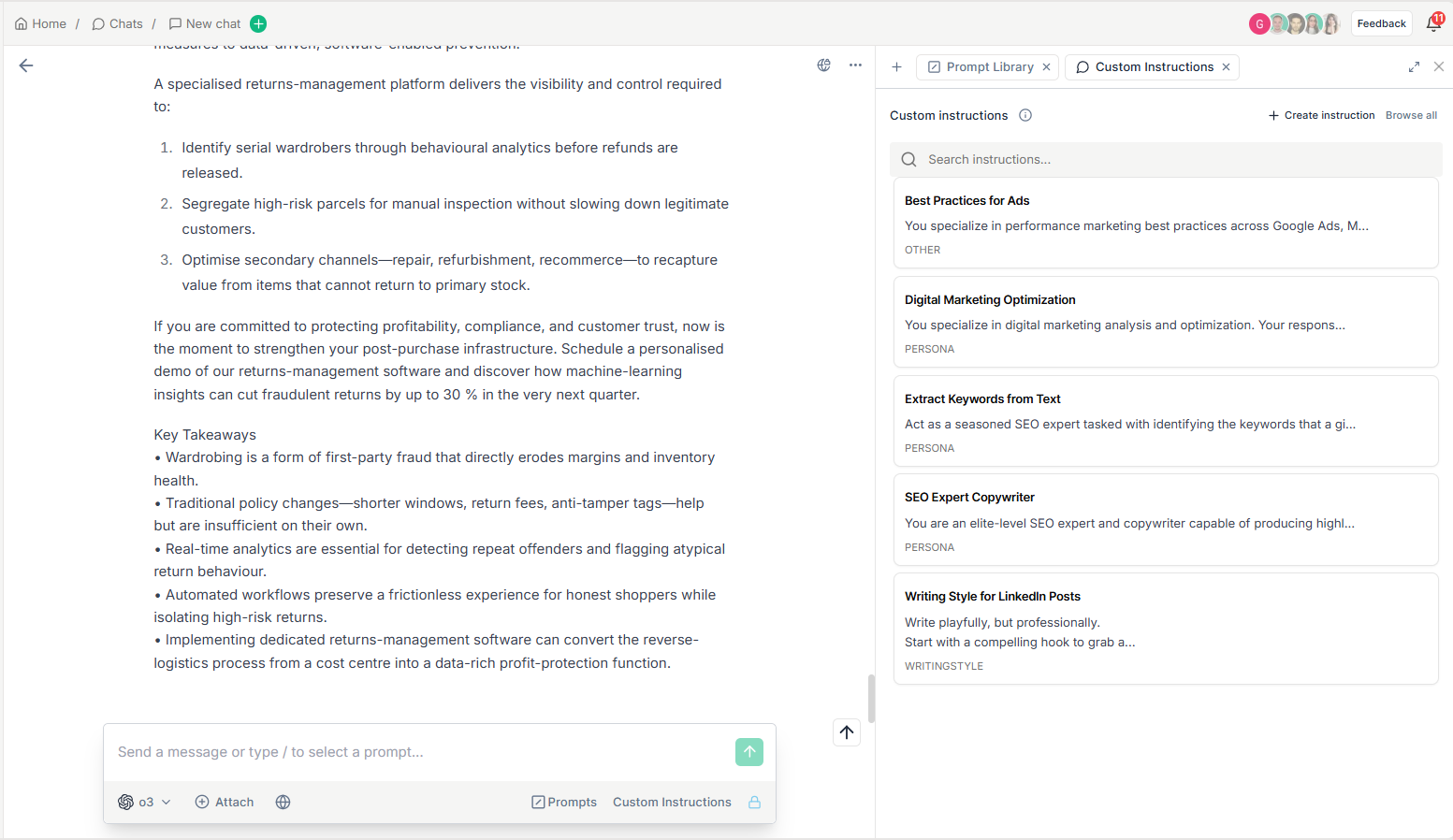
From there on, you can add your custom instructions, including the type of instructions (e.g., I selected WritingStyle, but there’s also BrandVoice, Persona, and more).
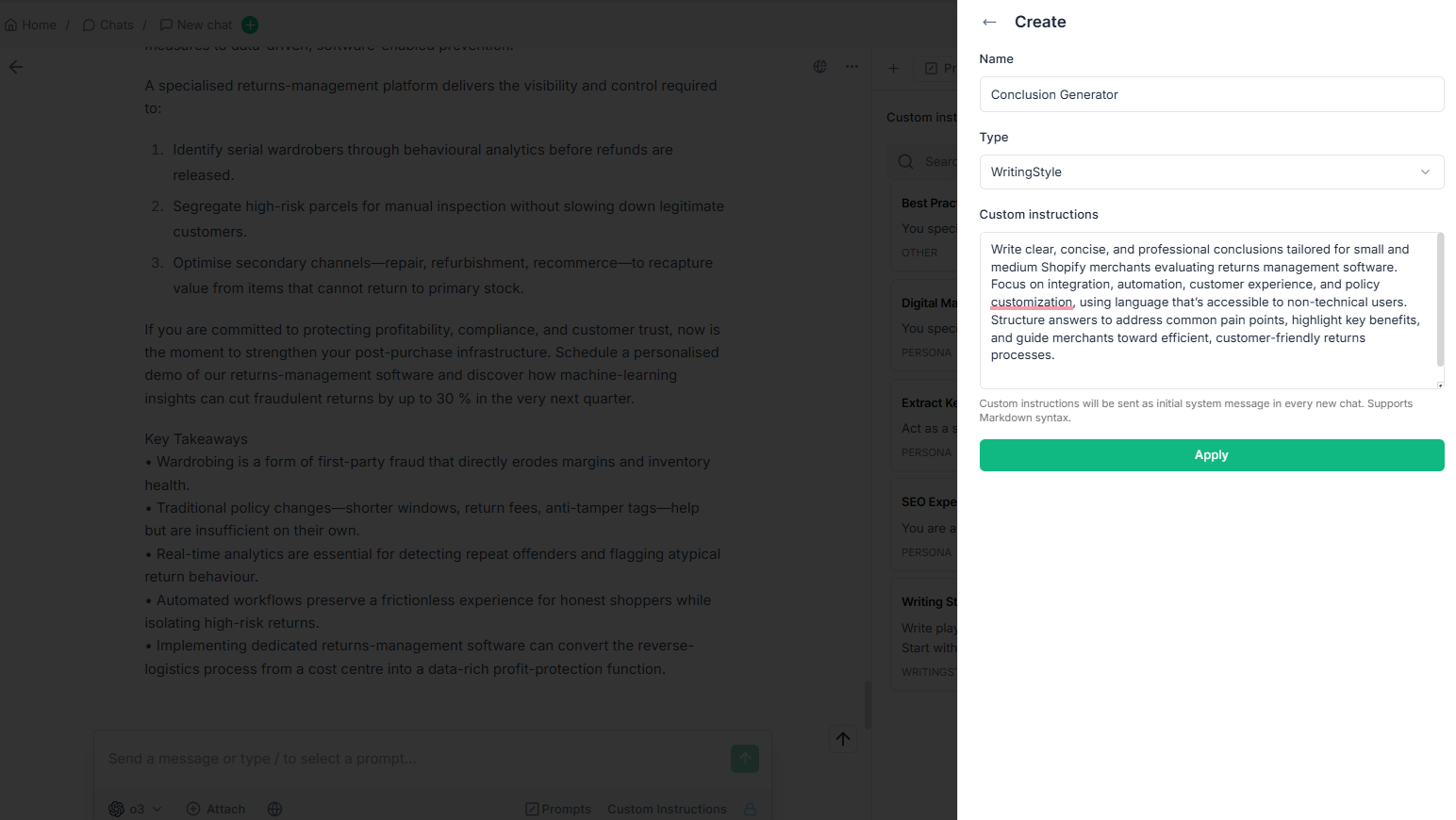
Team-GPT Pricing
Unlike most of the AI conclusion generators in this article, there’s no free plan for Team-GPT.
Team-GPT offers three paid plans based on your team size and needs:
- Starter Plan: Starts from $25 per user/month (billed annually). Designed for teams adopting AI efficiently, this plan includes a collaborative workspace for marketers and agencies, usage of the latest models by OpenAI and Anthropic, and usage reports.
- Growth Plan: Starts from $35 per user/month (billed annually). Built for teams scaling AI with governance, it includes everything in the Starter Plan plus unlimited model usage, Single Sign-On (SSO), advanced usage reports, option to bring your own API keys, integrations, and tailored onboarding.
- Enterprise Plan: Designed for organizations with 150 or more users, with custom pricing. It includes everything in the Growth Plan, plus unlimited workspaces, private cloud deployment, ability to add custom models, premium key account management, and enterprise-ready security measures.
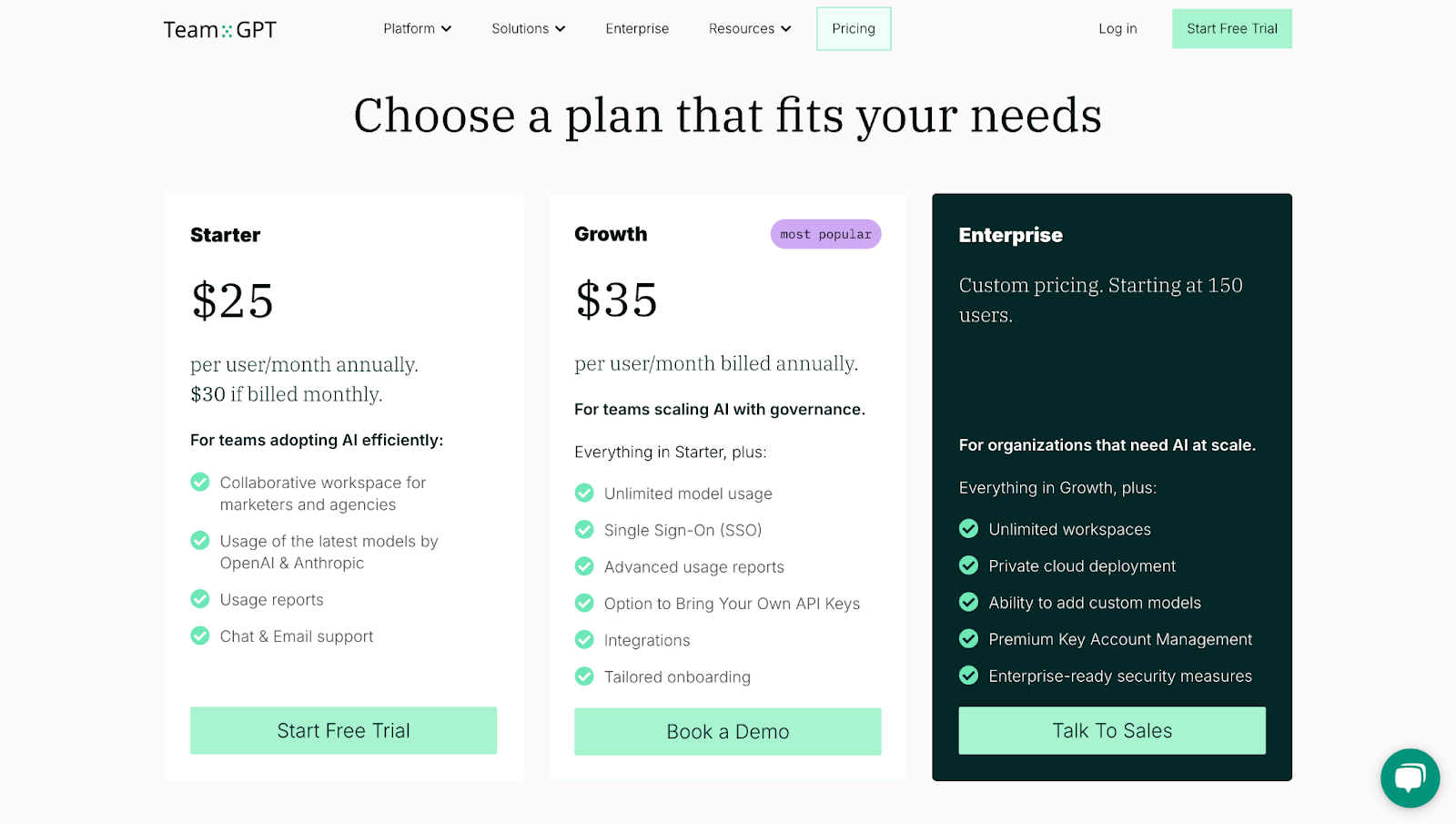
Team-GPT Pros and Cons
✅ A prompt builder that you can use to refine your conclusion generation prompt.
✅ Add custom instructions so the conclusion generator can write like you.
✅ Collaborate with your team on prompts and save the best ones.
✅ Turn the output into a page that is similar to Google Docs and refine from there.
❌ Only works inside Team-GPT.
❌ Not free like other competitors.
#2: Originality AI
Best for: Making your conclusion keyword-driven.
Price: Free.

Originality AI offers a conclusion generator that features a few forms, where you can select:
- The keywords to be included.
- The amount of words the conclusion needs to be – from 0 to 250 words.
Conclusion Output
Here’s the conclusion output that I was provided with from Originality AI:
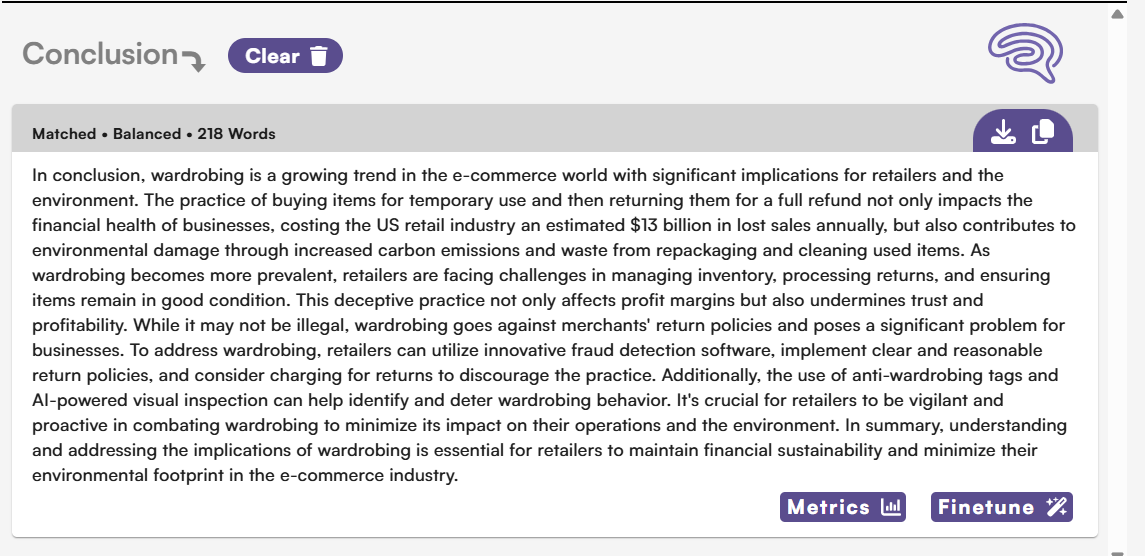
I noticed that the generator did a good job generating the conclusion to be SEO-friendly, but it did not position my solution or brand.
The platform also has the option to ‘’Finetune’’ the generated text, but it did not work when I tried clicking on it.
Pros & Cons
✅ Comprehensive conclusions that go over what has been discussed in the article.
✅ You can fine-tune the generated text.
✅ It’s possible to select the length of the conclusion.
❌ The ‘’finetune’’ option did not work for me when I tried it.
❌ The tool did not position my brand or solution in the end.
#3: Ahrefs
Best for: Generating conclusions in bullet points.
Price: Free.
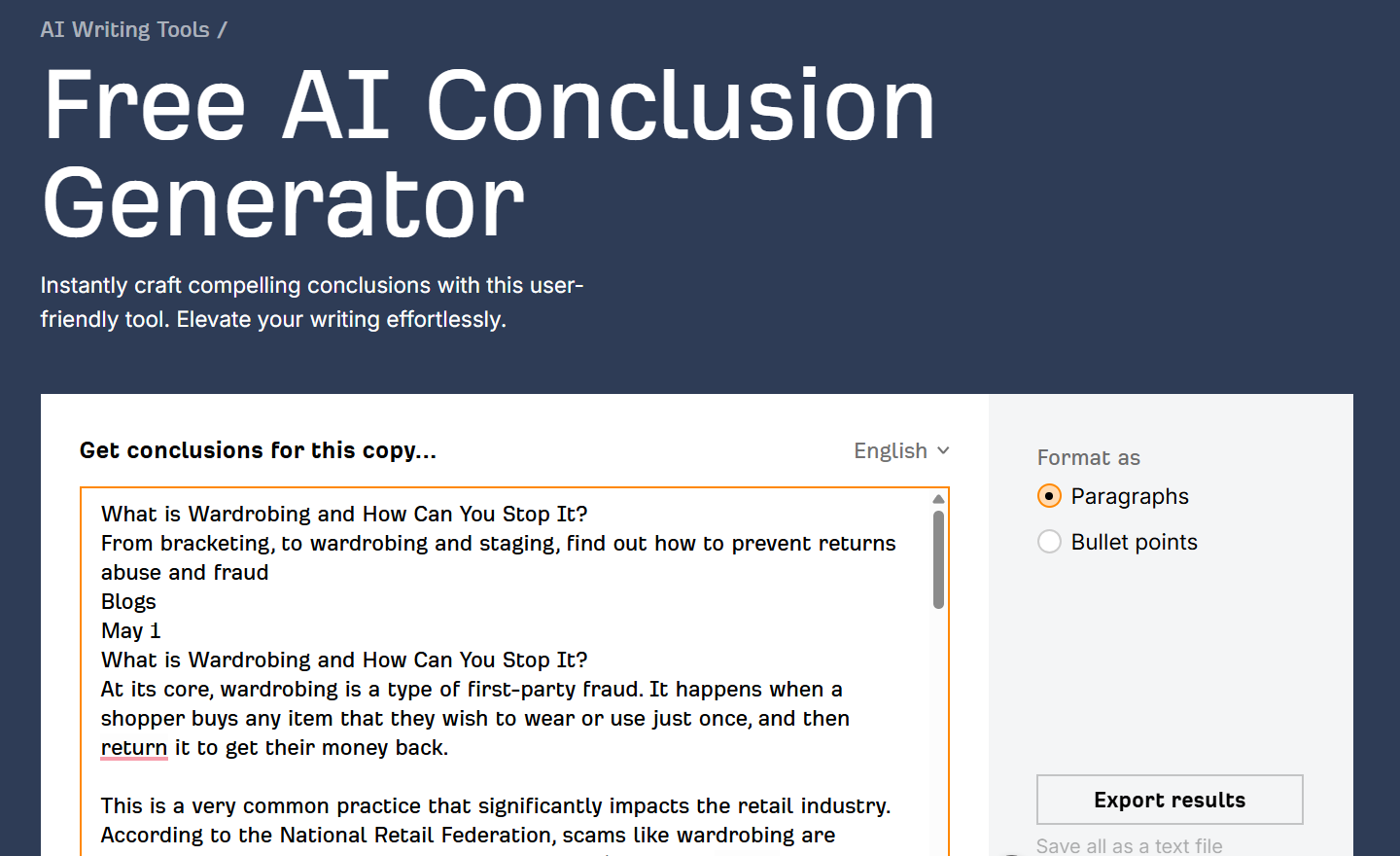
Ahrefs is an SEO tool that offers a conclusion generator, where you can select:
- The format of the conclusion – either paragraphs or bullet points.
- The tonality of the output (e.g., I chose formal).
Conclusion Output
Here’s the conclusion output that I was provided with from Ahrefs:
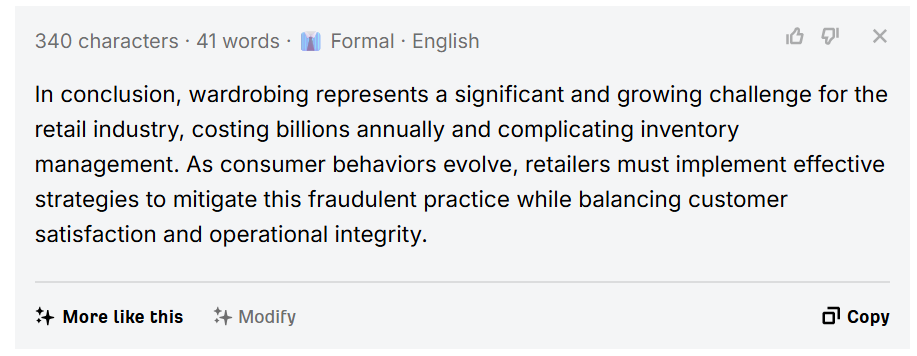
I noticed that the generator only generated me 41 words. When I clicked on ‘’Modify’’, I was able to select ‘’Expand’’ and the platform generated me 232 words the 2nd time, going into deeper detail:

Pros & Cons
✅ Comprehensive conclusions that go over what has been discussed in the article.
✅ You can rephrase, shorten, or broaden your conclusion.
✅ It’s possible to select if you want the conclusion to be in bullet points or paragraphs.
❌ There’s a hard limit on the summarizer of 13,112 characters, which is not ideal for long-form content.
❌ The tool did not position my brand or solution in the end, similar to Originality AI.
#4: Summarizer
Best for: Generating summaries from long-form content (up to 3,000 words).
Price: Free.

Summarizer, true to its name, offers a conclusion generator, where you can paste your content (up to 3,000 words) and generate a conclusion.
You can also select the length of the conclusion – up to 300 words.
Conclusion Output
Here’s the conclusion output that I was provided with from Summarizer:
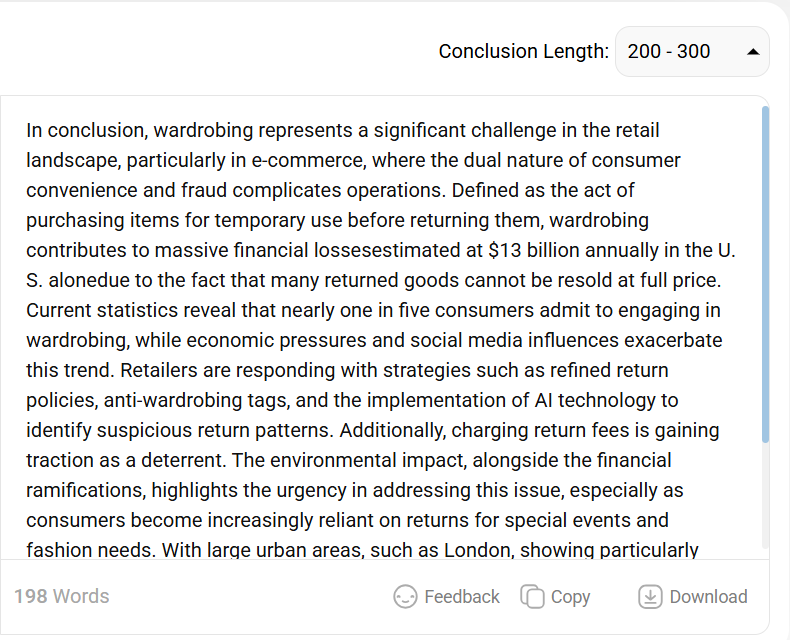
I noticed that the generator provided me with only 198 words when I asked for the 200 – 300 range, but, at least, the conclusion was straight to the point with minimal fluff.
There’s also a paid plan that offers a more advanced summarizer, which starts from $3/month when billed annually.
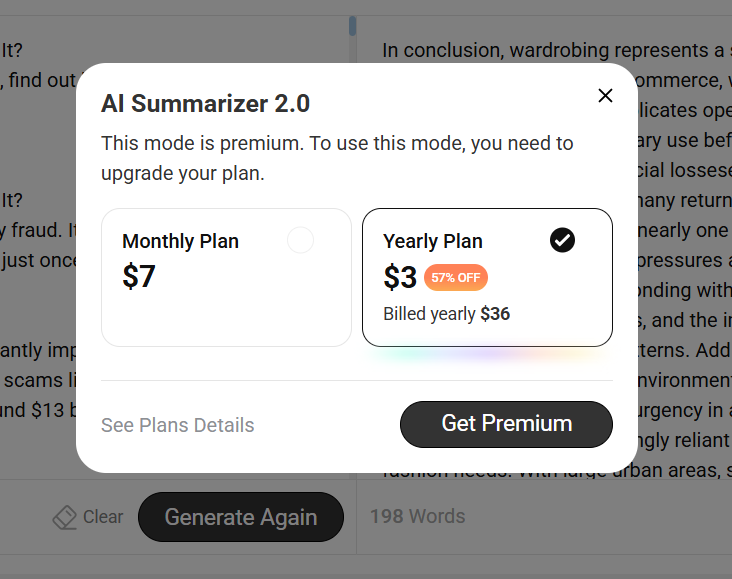
Pros & Cons
✅ There’s a premium version that costs $3/month when billed annually.
✅ There’s a limit of 3,000 words on the summarizer.
✅ You can choose the length of the conclusion.
❌ You’ll have to pay up to get the advanced version of the Summarizer.
❌ The tool did not position my brand or solution in the end, similar to other tools in this list.
#5: EduBirdie
Best for: Creating academic conclusions.
Price: Free.
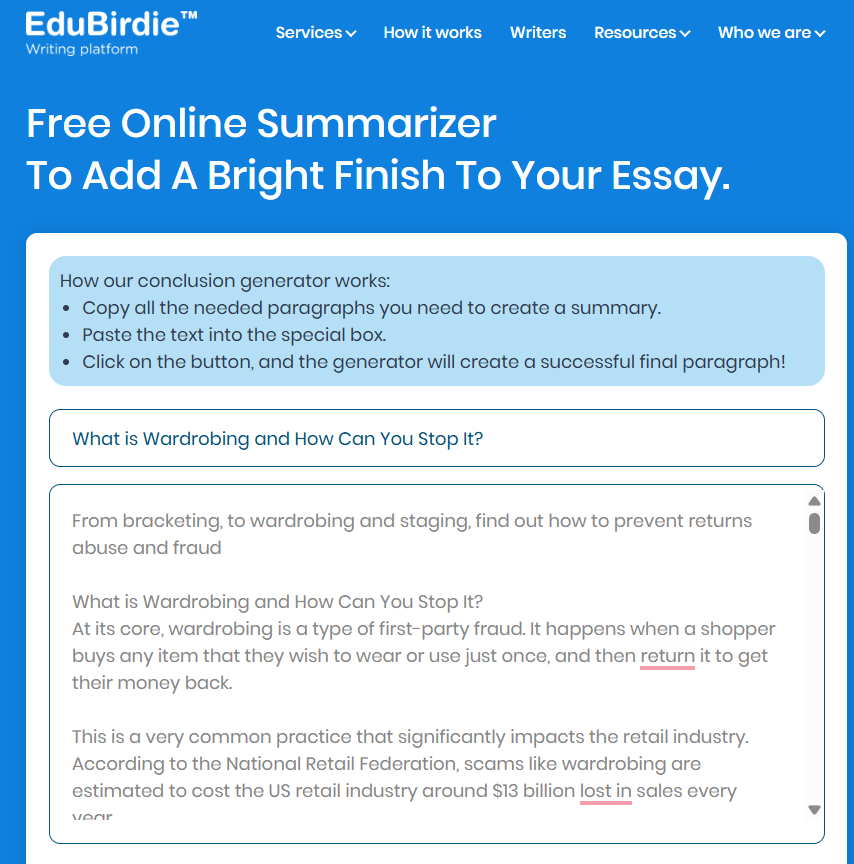
EduBirdie offers a conclusion generator, where you can paste your content and generate long-form conclusion (that is about 40% of the size of your original content).
Conclusion Output
Here’s the summary output that I was provided with from EduBirdie:
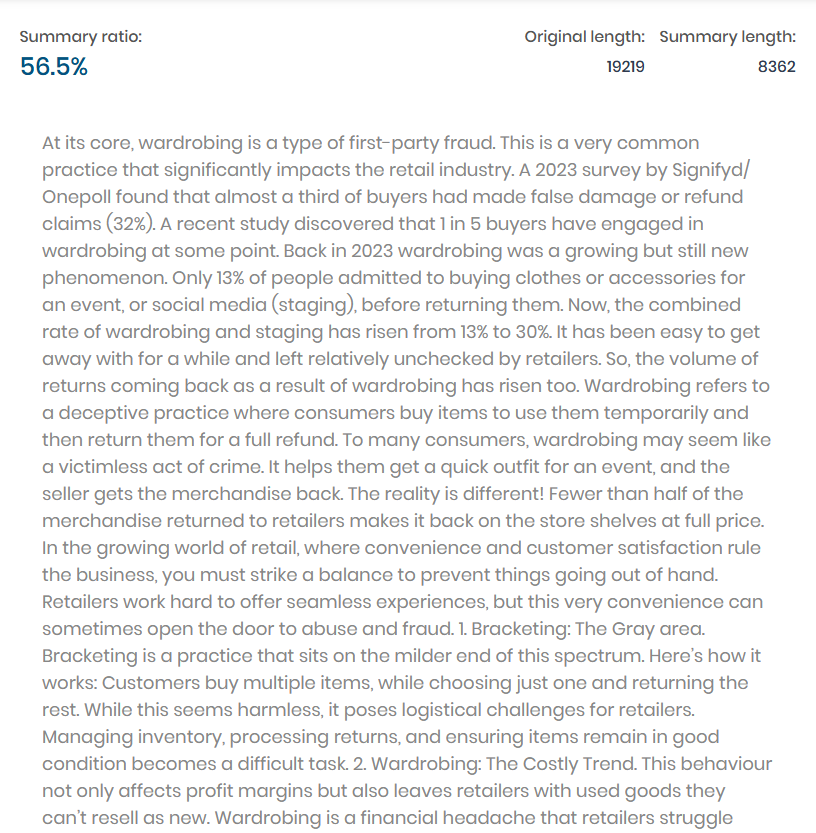
You can see that it’s quite long.
It’s about 40% of the original output, which means that it’d be a good way to either make your articles shorter or to create long-form summaries.
Pros & Cons
✅ Long form summary generation that is good for academics or for business documents.
❌ Such a long conclusion generation will probably not be very useful for article content.
❌ The tool did not position my brand or solution in the end, similar to other tools in this list.
#6: Embarque
Best for: Creating long-form conclusions.
Price: Free.

Embarque is an SEO agency that offers a conclusion generator, where you can paste your content and select the length of the conclusion from ‘’short’’ to ‘’medium’’ and ‘’long’’.
Conclusion Output
Here’s the summary output that I was provided with from Embarque:

The generator did a good job of summarizing the core information of the article, going over the key statistics and pain points of retailers.
Perhaps what I wanted to see less of was the fluff in the end, where it gave the standard AI phrase ‘’as the retail landscape continues to evolve’’, which can be easily detected nowadays.
Pros & Cons
✅ You can choose what kind of size you want your conclusion to be – either short, medium, or long.
❌ The generated text was a bit too obviously written by AI, especially in the end of the conclusion.
❌ The tool did not position my brand or solution in the end, similar to other tools in this list.
#7: Editpad
Best for: Generating conclusions in different languages.
Price: Free.

Editpad offers a conclusion generator, where you can paste your content (up to 3,000 words) and generate a conclusion.
What stood out to me is that you can also select the language you want the tool to generate the summary into – you can also select German, French, and Spanish.
Conclusion Output
Here’s the conclusion output that I was provided with from Editpad:

I noticed that the generator provided me with 179 words, which is not bad, and is relatively straight to the point with minimal fluff.
There’s also a paid ‘’Pro’’ plan that offers a more advanced summarizies, which starts from $159 when billed annually.

Pros & Cons
✅ There’s a Pro version that costs $19 when billed monthly.
✅ You can upload your content from a file.
❌ You’ll have to pay up to get the advanced version of the Editpad, similar to the Summarizer.
❌ The tool did not position my brand or solution in the end, similar to other tools in this list.
#8: Paperguide
Best for: Creating short and punchy conclusions.
Price: Free.
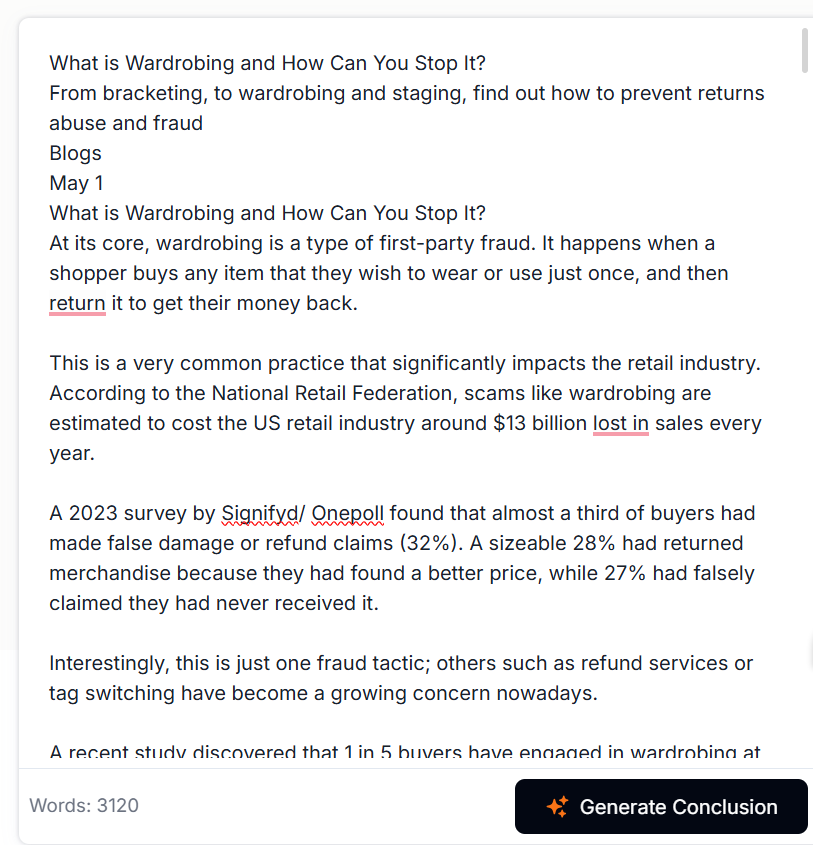
Editpad offers a conclusion generator, where you can paste your content and generate a conclusion.
What stood out to me is that the length of the article does not matter, as I was able to generate a conclusion for an article with 3,000+ words.
Conclusion Output
Here’s the conclusion output that I was provided with from Paperguide:
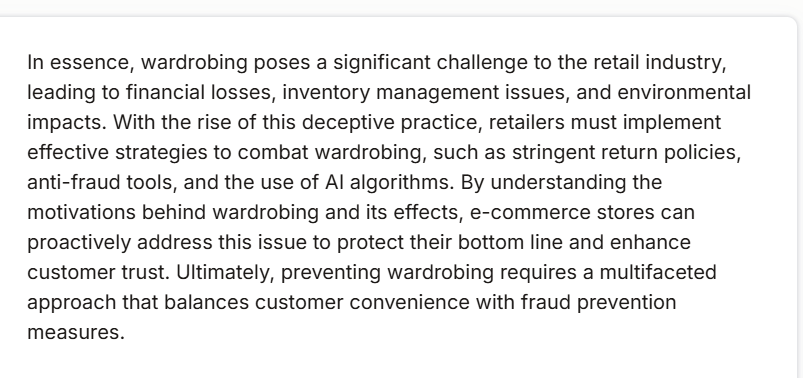
I noticed that the generator provided me with a conclusion of 89 words, which is not a bad length if I were looking for a short and punchy conclusion.
Pros & Cons
✅ You can paste content that is longer than 3,000 words.
✅ The conclusions are short but to the point.
✅ You can endlessly re-generate the conclusion until you get one that you like.
❌ The fact that the platform prioritizes short descriptions might be a problem for some users.
❌ The tool did not position my brand or solution in the end, similar to other tools in this list.
#9: Perfect Essay Writer
Best for: Creating conclusions for essays and academic papers.
Price: Free.
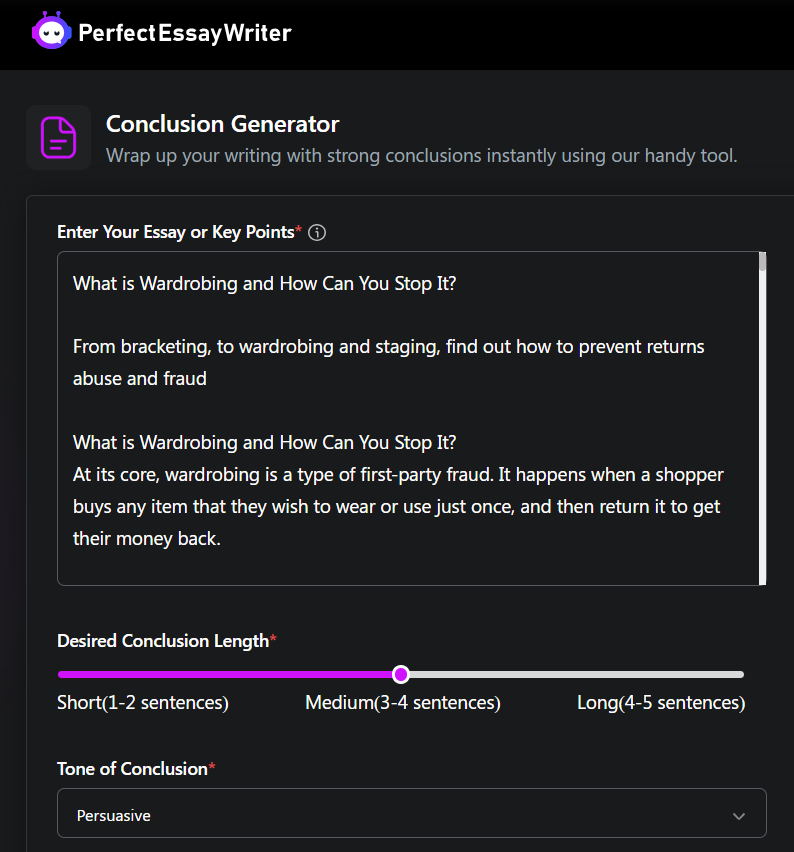
Perfect Essay Writer offers a conclusion generator, where you can paste your content and generate a conclusion.
Users can select the desired conclusion length – from 1 to 5 sentences, as well as the tone of conclusion (e.g., I selected ‘’persuasive’’).
Conclusion Output
Here’s the conclusion output that I was provided with from Perfect Essay Writer:

I noticed that the generator provided me with a short conclusion, but I liked how straight to the point it is with no fluff or obvious AI text. It sounds humane to me.
Pros & Cons
✅ You can select the size of the generated text.
✅ Short but straight to the point conclusions.
✅ Human-like conclusions.
❌ There’s no option to generate longer than 5 sentences conclusions.
❌ The tool did not position my brand or solution in the end, similar to other tools in this list.
#10: Edworking
Best for: Generating simplistic summaries of your content.
Price: Free.
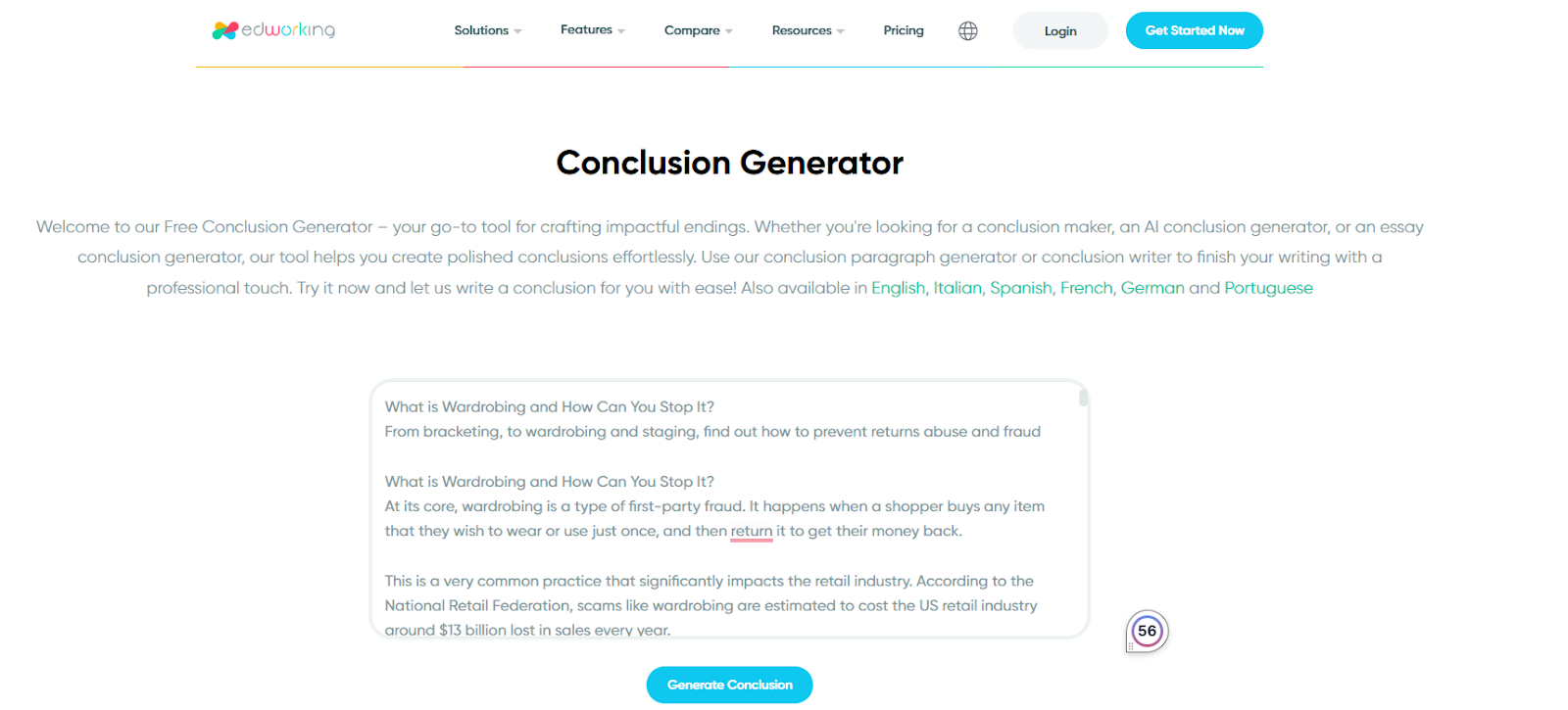
Edworking offers a rather simplistic conclusion generator, where you can paste your content and generate a conclusion.
There are no other options like there were on the other generators, which is why I put this generator on position #10 in this list.
Conclusion Output
Here’s the conclusion output that I was provided with from Edworking:
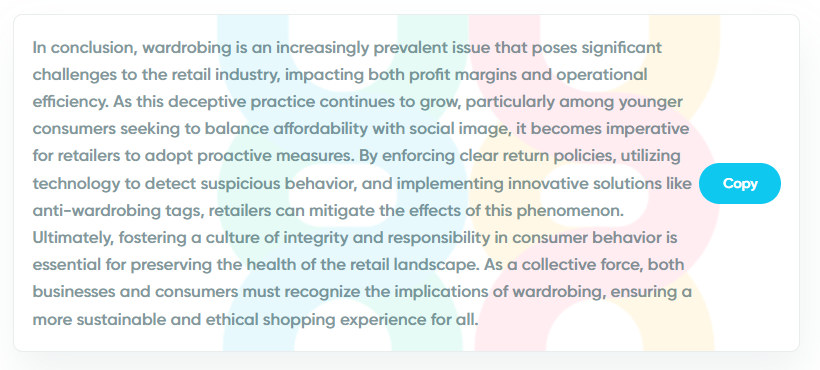
The generated output itself is quite simplistic and straight to the point with minimal fluff.
I like how the tool picked on the recommendations inside of the article and called them out in the conclusion.
Pros & Cons
✅ Short conclusions that are to the point.
✅ The tool has an eye out for recommendations to call them out.
❌ There were no additional options, such as tonality or length of the generated text.
❌ The tool did not position my brand or solution in the end, similar to other tools in this list.
Next Steps: Generate on-brand conclusions alongside your team in Team-GPT
The right AI-powered conclusion generator depends on what kind of summary you’re looking for.
If you’re looking for a quick and free solution that is easy to use and requires minimal input, you can go for Paperguide or Editpad.
On the other hand, if you’re looking for a tool that asks for more information about your article, you can give Originality AI’s and Perfect Essay Writer’s generators a chance.
However, if you are looking to generate on-brand conclusions that actually position your brand and solution in the end, Team-GPT is the best choice.
It’s designed for teams that want to scale AI usage without the chaos of scattered prompts, version mismatches, or siloed experimentation.
With Team-GPT, you get:
- A prompt builder, where you can build up your ideal prompt for conclusion generation.
- A shared prompt workspace for your entire company.
- Real-time collaboration across prompt experiments.
- Usage tracking to see what’s working and what’s not.
- Native support for OpenAI, Claude, Gemini, and more.
Book a demo or try it for free and see how it fits into your workflow.
Read More
- AI Agents For Small Businesses – Types, Use Cases & Software: A guide on how small businesses can use different types of AI agents effectively.
- 17 ChatGPT Prompts For Sales To Help You Win More Business: Sales-specific prompts designed to support outreach, follow-ups, and conversions.
- Best 10 AI Automation Tools & Software In 2025 [Reviewed]: An overview of the leading AI automation tools and what they offer.
- 15 Examples & Use Cases of AI Agents in 2025: Practical examples showing how AI agents are being used across industries.
- The 10 Best AI Sales Agents In 2025 [Reviewed]: A breakdown of the top AI sales agents helping teams close more deals.
- 32 AI Prompts For Business In 2025 That Work In Any Industry: A broad set of AI prompts that apply to multiple business functions.
- 10 Best AI Hook Generators in 2025 [Reviewed]: After trying a bunch of them, I narrowed it down to 10 that really stood out.
- 10 Best FAQ Generators In 2025: I’ll go over the 10 best FAQ generators on the market in 2025, going over both free-to-use and advanced generators for different use cases.
- 10 Best LinkedIn Post Generators In 2025 [Reviewed]: These are the 10 best LinkedIn post generators I’d actually recommend.

